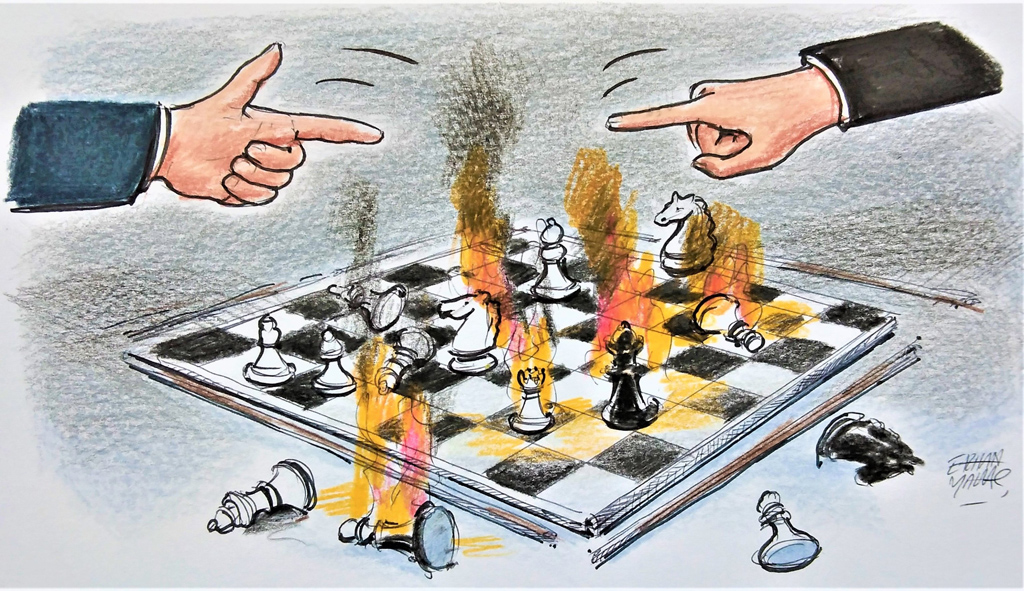Considering the devastating effects of new-generation weapons, global powers cannot launch direct wars against each other. Therefore, they prefer to engage in indirect battles, as the two superpowers, the United States and the Soviet Union, did during the Cold War. Their proxies fight each other; they control the tide of the war from behind closed doors by procuring military equipment and by providing economic and financial assistance to wage war.
The proxy wars during the Cold War aimed to prevent a possible mutual assured destruction. Since the two superpowers did not want to risk their national security, they tried to expand their respective sphere of influence by mobilizing and supporting their allies to prevent
the proxies of the other side from increasing their effectiveness in international politics. Also, they were largely ideologically driven wars.
The global powers, primarily Western countries, continued to wage indirect wars after the Cold War. Recently, non-Western regional and international powers began to imitate Western countries and initiated proxy wars in different parts of the world. However, unlike
the previous proxy wars, the most recent ones are “preventive” in nature. There are two kinds of preventive proxy wars. The first and most common type is a direct proxy war between parties. The civil war between different Libyan factions is an example of the first type. The
Syrian crisis is another example of a conflict between two or more proxies. There are at least three sides of the Syrian civil war, namely the Bashar Assad regime, supported by Iran and Russia; the PKK’s Syrian branch, the YPG, supported by the U.S. and other Western countries; and the mainstream Syrian opposition groups supported by Türkiye.
Ukraine war also a proxy
The second type is between a regional or global power and a proxy. The ongoing
Russia-Ukraine war is a clear example of the second type of preventive proxy war. Russia has been trying to prevent Ukraine from pursuing a Western-oriented foreign policy and becoming a NATO member by invading Ukraine. In other words, Russia has been trying to avoid eastward NATO expansionism, which it considers a redline.
Regional and global powers compete through proxy states or proxy non-state actors, violent or nonviolent. Preventive proxy wars are waged to prevent possible international shifts. For example, Russia has been waging different proxy wars in regions such as Georgia, Ukraine, Syria and Libya. In Georgia and Ukraine, Russia has unilaterally initiated wars and invasions to punish the ruling governments of the respective governments in those two countries. The main reason for the Russians was the possible NATO membership of these two states and the rule of their Western-oriented governments. Likewise, Russia has intervened in the Syrian and Libyan crises to prevent new Western projections for the Middle East. Russia has been trying to compete with Western countries in different parts of the world by supporting specific proxies.
Countries such as China, Israel, India and Türkiye also try to increase their influence or prevent specific regional shifts against their respective interests in other regional crises. For example, Türkiye has been intervening in the Syrian crisis to prevent the U.S. and other Western countries from creating a terror corridor in northern Syria. The United Arab Emirates (UAE) and Saudi Arabia are two regional powers intervening in regional crises for similar purposes.
Sudan is the new front of the new type of preventive proxy war. Unfortunately, Sudan has been driven into a civil war by domestic factions. Since April 15, more than 500 people have lost their lives. In addition, thousands were injured during the fight between the Sudanese Army led by Abdel Fattah al-Burhan and Sudan’s paramilitary group Rapid Support Forces (RSF) led by Mohamed Hamdan Dagalo (popularly known as Hemedti).
Aspects of the crisis
Regional and global powers can easily manipulate many dimensions of the complex Sudanese crisis for different reasons. In other words, the related external forces have been trying to intervene in the conflict to realize their expectations. While some states exploit the golden resources, others have expectations over the flow of the Nile River.
Many regional and global powers, such as the U.S., Russia, China, Egypt, Saudi Arabia, the UAE and Israel, play influential roles in Sudanese politics, and they exploit the already vulnerable situation in the country. As a result, these states influence the expansion and deepening of the crisis since they maintain contact with the conflicting parties in the country. In addition, some states used proxy non-state actors during the crisis. For example, Russia’s Wagner private military company and the UAE’s Khaftar play influential roles.
Sudan’s ongoing military crisis has a humanitarian dimension. The civil unrest will cause a large-scale humanitarian crisis. So far, hundreds of people have lost their lives. If the fight continues, thousands of innocent people may lose their lives. Another important humanitarian dimension of the conflict is the food insecurity and poverty in the country. Sudan, an already poor country that cannot provide food for its population, may face a deep food crisis due to the fight.
A third dimension of the humanitarian crisis is the refugee problem, which has both humanitarian and security dimensions. About 20,000 Sudanese have already arrived in Chad and Ethiopia, and the limited food cannot reach all refugees. Moreover, according to the United Nations High Commissioner for Refugees (UNHCR), if the violence does not stop, millions of Sudanese may flee the country.
The crisis has a security dimension, influencing regional countries such as the Central African Republic, South Sudan, Chad, Libya, Egypt, Ethiopia and Eritrea. The Sudanese crisis may trigger new situations in the neighboring countries. At a minimum, the refugee problem can shake the domestic balance in these states. The economies of the neighboring countries may suffer due to the refugee waves. As the fight continues, weapons and human trafficking will increase regional volatility.
[Daily Sabah, May 3 2023]









